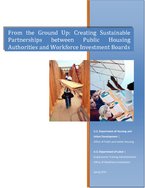Found 6 resources.
0
0
0
People experiencing homelessness disproportionately face systemic barriers to employment, which make finding and keeping a job neither simple nor easy.
Topics: Advocacy, Homelessness, Low-income, Stability, Workforce development
 Shared by Molli Caite Hughes
on Nov 15, 2023
Shared by Molli Caite Hughes
on Nov 15, 2023 0
0
0
To explore the benefits and challenges of rapid re-housing support services, How Housing Matters asked a group of experts to weigh in. Contributing to the discussion are Kathryn Monet, chief executive officer at the National Coalition for Homeless Veterans, Jacob Donnelly, director of supportive services at Swords to Plowshares, and Samantha Batko, research associate at the Urban Institute.
Topics: Asset building, Health, Homelessness, Housing, Low-income, Supportive housing, Workforce development
 Shared by Housing Is
on Jan 24, 2019
Shared by Housing Is
on Jan 24, 2019 0
0
0
The Trump Administration proposed draconian changes today in a key SNAP (food stamp) rule which, if implemented, would cut off basic food assistance for hundreds of thousands of the nation’s poorest and most destitute people. The Administration and House Republican leaders sought, but failed, to secure these changes as part of the farm bill that Congress just passed. The Administration is now proposing to implement, through executive action, what it failed to secure through legislation.
Topics: Food insecurity, Legislation & Policy, Low-income, Nutrition, Workforce development
 Shared by Housing Is
on Dec 20, 2018
Shared by Housing Is
on Dec 20, 2018 0
0
0
In response to the heightened interest in the relationship between work and the health of individuals and communities, CMCS has clarified that Medicaid funds cannot be used to pay beneficiaries’ wages, but can pay for employment counseling as an optional benefit—to help people get jobs. Years of experience with work requirements for the Supplemental Nutrition Assistance Program, Aid to Families with Dependent Children, and populations with disabilities have developed the evidence for what is needed to help different populations find and keep jobs.
Topics: Affordable Care Act, Disabilities, Health, Legislation & Policy, Low-income, Medicaid / Medicare, Research, Stability, Workforce development
0
0
0
Stricter work requirement policies for the Supplemental Nutrition Assistance Program (SNAP) at the federal level were left out of the recently passed farm bill, but state policymakers are still considering whether to expand or establish their own work requirements for SNAP and Medicaid, with the goal of incentivizing employment. There’s no question that good jobs help spur upward mobility. But if we are serious about helping people work, we have to get serious about helping people improve their skills.
Topics: Child welfare, Cost effectiveness, Dual-generation, Early childhood, Food insecurity, Legislation & Policy, Low-income, Research, Stability, Workforce development
0
0
0
Assisting public housing residents on the path towards self-sufficiency requires going beyond providing decent, safe, and affordable housing. Public housing residents may face barriers to employment, such as limited education, job skills and/or proficiency in the English language. This toolkit is a resource for both frontline staff and management. It offers examples of how partnerships between DOL and HUD can increase public housing resident employment and create mutual benefit for both agencies.
Topics: Criminal justice, Disabilities, Funding, Housing, Legislation & Policy, Low-income, MTW, Partnerships, Workforce development
 Shared by Housing Is
on Jul 19, 2018
Shared by Housing Is
on Jul 19, 2018 
